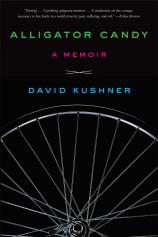Alligator Candy: A Memoir
Review
Alligator Candy: A Memoir
Being at once a memoir, eulogy and reflection on how people survive after experiencing tragedy, David Kushner’s ALLIGATOR CANDY is a remarkable book. It is first and foremost a loving tribute to Kushner’s older brother, Jon, who in 1973 was kidnapped and brutally murdered by two strangers when he took a shortcut through the woods behind his house on his way to the convenience store. At the time, Kushner was only four years old, so he lacks concrete memories of the crime and its direct aftermath. Forty years later as an award-winning journalist, he has returned to his childhood home in Tampa Bay, Florida, to tell Jon’s story from the perspective of both reporter and brother.
Memory plays an important role in ALLIGATOR CANDY as we count the many ways that people are able to remember and discuss trauma. Kushner’s own hazy memories, as well as those of his parents and oldest brother, Andy, at different times corroborate and contrast with police reports, the killers’ statements, and testimony from townspeople. As the book reads on, the reader is less and less inclined to inquire after an all-encompassing truth, for the author makes it clear that there is no such thing. Formal explanations for cases like these, no matter how detailed they may be, are never truly satisfying because this type of crime, child killing, simply does not make sense.
"ALLIGATOR CANDY is one of the best books I’ve read this year and one of the most moving I’ve encountered in a long time. It is tragic yet quietly so, intellectual without being pedantic."
The awful illogic of the events leading up to Jon’s murder becomes a focal point in the book. This arises in the details: What did Jon buy at the store? Why did he go in the first place? What did his killer take as a trophy? Candy, Snappy Gator Gum, for his little brother, David. Again, the candy…
As Kushner and his family struggle to come to terms with Jon’s death, so does the reader. We come to know and love Jon and the rest of the Kushner clan, or at least, we can empathize with their unfailing love for him. The author elicits this emotion through his brief yet powerful descriptions of bedrooms, photographs, crayon drawings and the like. He also does an artful job of weaving his research into the narrative, only quoting directly when it matters most, such as when he includes excerpts from his mother’s journal. The result is that the book never once becomes dry or boring.
Outside of Jon’s murder, Kushner takes us deeper into his family history, going all the way back to when his parents first met at a party at the University of Arizona in 1958. His aim here is complex: to carry on the work of his father, an anthropologist who studied how cultures of oppressed people survive, by painting a picture of family life during the late ’60s and early ’70s and with Jon’s death, a threshold-crossing into the age of milk cartons and the missing children movement. Kushner succeeds in conveying his distress over free play’s evolution into regimented after-school activities and helicopter parenting. As someone who lived through every family’s worst nightmare and now finds himself a father, he makes a heart-wrenching and compelling argument for how independence helps kids grow into functional adults.
ALLIGATOR CANDY is one of the best books I’ve read this year and one of the most moving I’ve encountered in a long time. It is tragic yet quietly so, intellectual without being pedantic. Although I read it quickly, it has stuck with me. I suspect it will continue to do so.
Reviewed by Alex Bowditch on April 8, 2016
Alligator Candy: A Memoir
- Publication Date: March 21, 2017
- Genres: Memoir, Nonfiction
- Paperback: 256 pages
- Publisher: Simon & Schuster
- ISBN-10: 1451682603
- ISBN-13: 9781451682601





